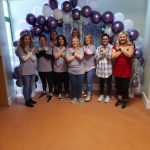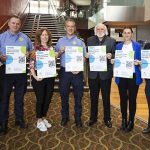Home / Successful Projects / Mid-West Regional Drugs Task Force (MWRDAF) launches QR (Quick Response) Code to quickly access drug and alcohol services in the Midwest
Mid-West Regional Drugs Task Force (MWRDAF) launches QR (Quick Response) Code to quickly access drug and alcohol services in the Midwest

Pictured: Claire Kearns, Nurse for Students on Campus UL, Insp. Ollie Kennedy, Henry Street and Rionach Power, Development Work Mid-West Regional Drugs and Alcohol Forum., Garda Sargent Shane Davern, Mick Lacey, Mid-West Regional Drugs and Alcohol Forum Chairman, Helen Ryan, Regional Coordinator Mid-West Regional Drugs and Alcohol Forum and Mike Walsh, Team Leader of Community Substance Misuse team (Picture: Alan Place)
At the first face-to-face meeting of the Mid-West Regional Drugs & Alcohol Forum (MWRDAF) since Covid, Chairperson Mick Lacey formally launched a new MWRDAF poster and business card with its unique QR code which links people directly to the drug and alcohol support services available in the Midwest Region.
The MWRDAF Chairperson emphasised strongly the importance of linking people to supports and networks while always maintaining the elements of collaboration and compassion. “Many people may not be aware that there is free and confidential support available for people who are experiencing substance use problems. In the Midwest, we have a number of services to help people, no matter what they are using; to explore how and why they commenced or continue using. We also have services for families of those affected by a family member who continues to use. These supports can be of assistance and tremendous benefit to individuals and families. Most services operate on an outreach basis, where meetings can be arranged in a venue that may feel more comfortable for individuals, rather than accessing a drug service directly. Making a call to any one of the services available, will put a person on a pathway of support, and if your needs are better suited to another service, they will do that link up with your agreement.”
The initiative of using a QR code was developed from the MWRDAF 3rd Level Drug and Alcohol Network and proposed by Claire Kearns, Nurse Practice Manager with UL Student Health Centre, noting that students use their phones for almost everything and it is a quick and discreet way of accessing information. It has the benefit of being useful to the broader population too.
An Garda Siochana, also represented on the MWRDAF 3rd Level Drug and Alcohol Network, through Sgt Shane Davern also welcomed the initiative noting that An Garda Siochana are called to situations and due to the activity or a persons’ behaviour while under the influence of substances, need to be brought to the local Garda station. “If a person comes to our attention while under the influence, there is a problem, so we welcome having the Posters & cards available at Garda stations and with local Gardai, where people can find information on help & support if they want It.”
The MWRDAF Chairperson encouraged the promotion of the QR poster and card throughout local communities; with persons in crises, students, parents, family liaison professionals, schools and right across the broad spectrum of society and thereby enhancing easier access to relevant agencies throughout Clare, Limerick and North Tipperary,
Finally, he thanked the 3rd Level Drug and Alcohol Network and MWRDAF staff who developed the initiative and who will now be responsible for keeping the information on drug and alcohol services in the Midwest updated on the MWRDAF website.
Drug and Alcohol Services in the Midwest can be found on the MWRDAF website mwrdtf.ie/supports. The MWRDAF is one of 10 Regional Drug and Alcohol Task Forces established in 2003 to support the implementation of the National Drugs Strategy at local level.



